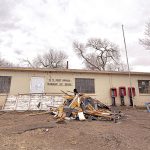
50 Years Ago: Congressional investigation has everyone wondering, concerned
When Navajo tribal leaders learned 50 years ago that Congress was going to investigate the tribe, no one knew what to say. So they said nothing.
When asked by the Navajo Times for a response to the announcement, the tribe’s chairman, Raymond Nakai, gave a curt “no comment.” He said the same to the dozens of other reporters who called for a comment.
It was obvious that Nakai had concerns because he didn’t know exactly what Congress planned to investigate. But neither did anyone else on the reservation.
In fact, Nakai was caught flat-footed. He had no idea there was going to be an investigation until U.S. Senator Clinton Anderson announced it onFeb. 7 at a meeting of the House Interior Committee.
At that time, Anderson, who was chairman of the committee, said he wanted an investigation into all of the problems on the reservation. And that’s all he would say.
There were a lot of members on the Navajo Tribal Council who had been saying for years that the biggest problem on the reservation was Nakai and the way he was leading the tribe. Nakai, on the other hand, blamed members of the Old Guard for being a bottleneck to progress on the reservation.
So it was obvious that Nakai was worried even though he had forged a good relation with Stewart Udall, the Secretary of the Interior. But even Udall told reporters he had no idea what Anderson planned to do.
What was known was that Anderson had been saying he wanted a probe of the reservation for more than a year but he could never get Congress to release the funds to make such an investigation possible.
But as 1966 began, money became available and Anderson immediately acquired enough to begin his investigation into – well, that was the big question.
Anderson said he was sending two staff members to Window Rock to acquire documents but he wouldn’t say what kind of documents they would be looking for which resulted in some reporters saying Anderson was being secretive because if he said what documents he wanted, they may be doctored or lost entirely.
Graham Holmes, the new area superintendent, was just as puzzled as Nakai was.
He said he had been in a meeting when the call came in about Anderson’s announcement, when asked what he thought the investigation would be about, Holmes just shook his head.
“I don’t know, but we are trying to get more information about this,” he said.
Holmes also pointed out that he had been superintendent only for about a month indicating that whatever the problems were that Anderson was going to look at, he had nothing to do with it.
It was possible, Holmes said, that the investigation or at least part of it would center on the relationship between the tribe and the BIA but he added he couldn’t say how this could be investigated.
He added that he had no contact with Anderson or anyone in Congress and the only information he had was coming from Udall.
“However, I plan to talk with Washington about the entire business,” Holmes said. “Then perhaps we can make a clear statement with facts included.”
A lot of rumors began floating around the reservation that this subject or that subject would come under investigation but no one could say for certain exactly where Anderson planned to go with his investigation and this caused a lot of talk.
A member of the Old Guard who was not identified told reporters that this investigation “could prove interesting, enlightening and highly embarrassing for somebody” if it was conducted properly.
That somebody, of course, would be Nakai, which only made him more paranoid about the whole situation since he would begin visiting chapters in the next few months as he prepared for a tribal election to vote in a new chairman.
Nakai was confident he would win, he told supporters, because he knew of no one on the reservation who had the clout to oppose him. In fact, Nakai said, he had not heard of anyone so far who even wanted to run against him.
There were several members of the “Old Guard” in the council who wanted to see him ousted but none of them – even Howard Gorman, who represented Ganado on the council – felt they were well known in other parts of the reservation to make a run against Nakai possible.
The most popular and well-known member of the council was Annie Wauneka and she had stated numerous times that she didn’t want to become chairman or chairwoman.
So the question lingered this week – would there be anyone to oppose Nakai?
To read the full article, pick up your copy of the Navajo Times at your nearest newsstand Thursday mornings!
Are you a digital subscriber? Read the most recent three weeks of stories by logging in to your online account.








 Highway 264,
Highway 264, I-40, WB @ Winslow
I-40, WB @ Winslow